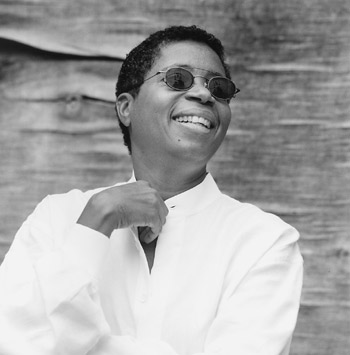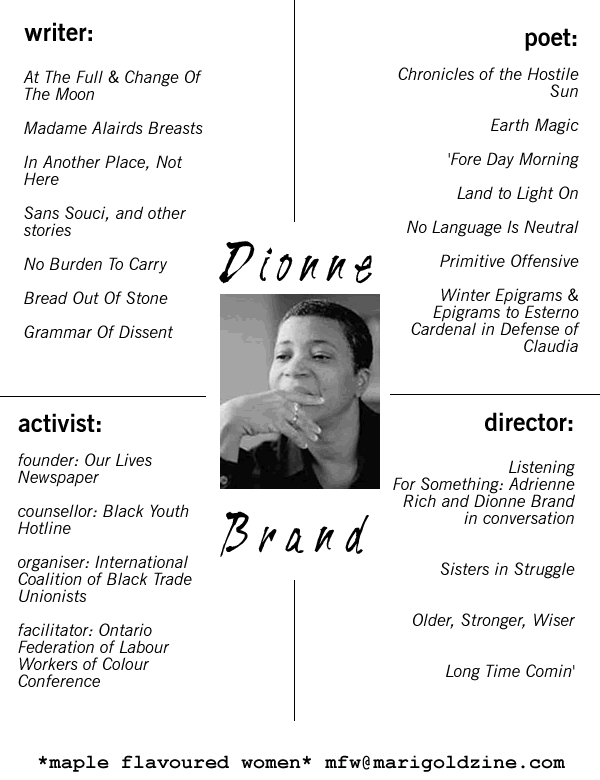 Dionne
Brand. . . Dionne
Brand. . .
Dionne Brand was born in
Trinidad in 1953 and has lived in Canada since 1970. She
attended the University of Toronto, where she earned a B.A. in
English and Philosophy and an M.A. in the Philosophy of
Education, and worked on a Ph.D. in Women's History. She has
taught English Literature and Creative Writing at Guelph, York,
and Toronto universities, and has been Writer in Residence both
at the University of Toronto and at the Halifax City Regional
Library. She has taught poetry writing at West Coast Women and
Words Summer School in Vancouver and at the Humber School of
Writing in Toronto.
Dionne Brand's world view
is expressed in books, film, and social activism. In the 1970s
and 80s she worked as a community worker in Toronto in several
capacities, including Counsellor at the Immigrant Women's Centre
and at the Black Youth Hotline, and Community Relations Worker
for the Board of Education. In 1986 alone, she was a founding
member of a community newspaper called Our Lives and of the
International Coalition of Black Trade Unionists; she acted as a
facilitator for the Ontario Federation of Labour (OFL) Women's
Committee, the OFL Workers of Colour Conference, and the Metro
Labour Council Anti-Racism Conference; and she served on the
board of a shelter for battered women. In 1983 she spent a year
as an information Officer for the Caribbean People's Development
Agencies and the Agency for Rural Transformation in Grenada, to
assist in the revolution there. She was evacuated after the
American invasion.
The ability to make
history concrete by capturing the small, ordinary things of life
along with a sense of broader historical actions is not found
too frequently in English poetry, particularly in North America.
Dionne Brand, however, is a significant exception. To read her
poetry is to read not only about her but also about her people
and their struggles both in Canada and the Caribbean. In the
introduction to her poetry published in A Caribbean Dozen, a
collection of poetry for children, Dionne Brand illustrates both
her biographical and literary background, pinpointing the
essence of her desire to write:
|

Click to Enlarge
|
"I was born deep
in the south of Trinidad in a village called Guayguayare. Our
house was so close to the ocean that when the tide came in the
pillow tree logs on which the house stood were almost covered by
surf. When I was four or so my grandmother, who brought me up,
moved to San Fernando, but every holiday we would return to
Guaya where my grandfather lived. It is the place I remember and
love the most. I now live in Toronto, Canada, but each time I go
back to Trinidad I always go to Guayguayare just to see the
ocean there, to breathe in the smell of copra drying and wood
burning and fish frying. In the Sixties when I was in elementary
and high schools, none of the books we studied were about Black
people's lives; they were about Europeans, mostly the British.
But I felt that Black people's experiences were as important and
as valuable, and needed to be written down and read about. This
is why I became a writer. In San Fernando I went to a girls'
high school where I was taught that girls could use their
intellect to live a full life. My teachers and friends there
helped me to see that women should enjoy the same rights and
freedoms as men. When I moved to Canada in 1970 I joined the
civil rights, feminist and socialist movements. I was only
seventeen but I already knew that to live freely in the world as
a Black woman I would have to involve myself in political action
as well as writing."
Since 1989, Dionne Brand had directed four documentary films for
the National Film Board of Canada: Listening for Something --
Adrienne Rich and Dionne Brand in Conversation; Long Time
Comin', about two Black women artists: Sisters in the
Struggle, about Black women activists fighting racism and
sexism; and older, Stronger, Wiser, five portraits of older
Black Canadian women.
In 1991 Brand toured England, Scotland and the Netherlands to
give public readings. In the same year she toured South Africa
as part of The New Nation Writers' Conference, a celebration of
Nelson Mandela's release sponsored by the The New Nation
independent weekly newspaper, which brought together
international writers and South African returnees from all over
the world.
Dionne Brand has published books on racism and on Black women's
history in Canada, as well as a collection of stories, Sans
Souci and Other Stories. Her first novel, In Another
Place, Not Here was published to acclaim in 1996. She has
edited anthologies, reports, and magazines. Her stories and
poems have appeared in many literary magazines and in over a
dozen anthologies, including The Penguin Book of Caribbean
Verse in English and Black Poetry; Finding Courage:
Stories by Women; From Ink Lake: Canadian Stories
Selected by Michael Ondaatje; and the Oxford anthologies Stories
by Canadian Women and Poetry by Canadian Women. Her poetry has
been shortlisted for several Canadian awards, and her work is
featured in American women's studies and Black studies courses.
A Land to Light On is her seventh book of poetry. She is
currently at work on a novel, At the Full Change of the Moon,
about a nineteenth-century Caribbean slave and her modern-day
descendants all over the world.
About influences on her
work, Brand has said: "What some white reviewers lack is the
sense of what literature that is made by Black people and other
people of colour is about. If you read my work, you have to read
Toni Morrison, you have to read Derek Walcott, Rosa Guy, Jean
Rhys, Paule Marshall, Michael Anthony, Eddie Brathwaite, and
African writers and poets...Bessie Head. I don't consider myself
on any margin, on the margin of Canadian Literature. I'm sitting
right in the middle of Black Literature, because that's who I
read, that's who I respond to" (Books in Canada, October
1990: 14). More recently, Brand has said that she counts as
influences Pablo Neruda, Bertold Brecht, Martin Carter, Roque
Dalton, Taban Lo Liyong, Sonia Sanchez, Nikki Giovanni, Nicolas
Guillen, and Aimé Césaire.
Significant issues and themes that Brand takes up in her work
include the experience of existing on the external frontiers of
the Caribbean diaspora, issues of personal and national
identity, her experience as a lesbian, colonial oppression and
its consequences on the colonial subject, multiculturality
reflected in a multicultural identity, and the immigrant
experience in Canada. Her self-articulation is an act of
liberation, breaking the silence and giving voice to the
silenced and marginalized people of her world.
Dionne Brand lives north of Toronto.
Source: Canadian Poets:
http://www.library.utoronto.ca/canpoetry/brand/
Northwest Passages:
http://www.nwpassages.com/bios/brand.asp
|